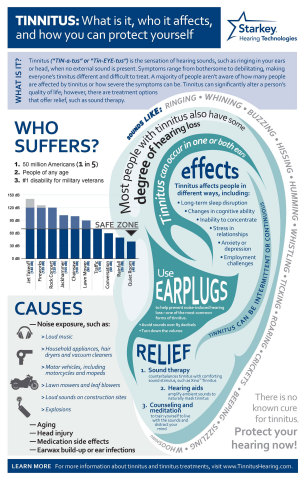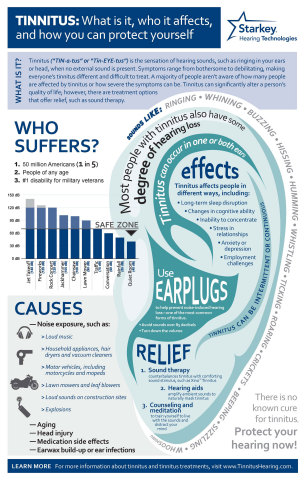MINNEAPOLIS--(BUSINESS WIRE)--Tinnitus Awareness Week takes place May 19 to 25, during Better Hearing and Speech Month. At a time when loud noises are an everyday occurrence—from city traffic and lawnmowers to hairdryers and earbuds on personal music devices—it’s important to learn how to protect yourself from hearing damage and its resulting effects, including tinnitus.
Tinnitus 411: What you need to know about ringing ears
For 16 long months, Kevin Kilian struggled to understand everyday conversation. It was difficult for him to communicate with anyone, especially his three-year-old granddaughter. He had trouble sleeping and was often stressed, irritable and depressed. The cause? An extremely high-pitched, high-volume ringing in his right ear—otherwise known as tinnitus.
For some people, like Kevin Kilian, tinnitus can be debilitating. “The non-stop ringing caused frustration in every area of my life,” says Kilian. “I couldn’t enjoy fishing, going to the movies or even having simple conversations.”
Tinnitus is more common than most realize. It affects one in five Americans, yet many people are still uneducated about what tinnitus is, how it’s caused and available treatment options.
What is tinnitus?
Tinnitus is the sensation of hearing
sounds, such as ringing in your ears or head, when no external sound is
present. Symptoms range from mild to severe and can include any number
of sounds such as buzzing, ringing, roaring or hissing. Tinnitus can
affect one or both ears either sporadically or constantly, making
everyone’s tinnitus different and difficult to treat.
Like Kilian, those who have tinnitus often report trouble sleeping, an inability to concentrate or complete tasks and changes in cognitive ability. It can be a source of stress in a relationship, cause anxiety or depression, and even pose employment challenges.
Where does tinnitus come from?
Tinnitus is most commonly
caused by exposure to loud sounds which can damage sensory hair cells in
the inner ear. A sound’s loudness is measured in decibels (dB). Sounds
louder than 85dB, or about that of city traffic, have the potential to
cause irreversible damage to the sensory hairs inside the ear. These
hair cells are sensitive structures that turn sound energy into signals
that travel to the brain. They make hearing possible, but once damaged,
they are gone for good.
Many people are surprised to learn that simple household items like hair dryers, vacuums and lawn mowers can damage their hearing. Noise-induced hearing loss and tinnitus can generate over time from exposure to a variety of common sounds. Everything from loud music and improper ear bud use to a loud kitchen blender or electrical hand tool can contribute to hearing loss.
Other causes of tinnitus and hearing loss include aging, a severe head injury, earwax build-up, an ear infection or medication side effects. For Kilian, a common cold triggered a severe middle ear infection that worsened and transformed into the tinnitus he lives with now.
Who does tinnitus affect?
Tinnitus is a common condition,
and it can affect anyone regardless of age. One in five Americans have
some form of tinnitus, and 16 million people have serious tinnitus that
requires medical attention. It’s also the most common disability for
military veterans, since it can be caused by extended exposure to loud
noise.
Treating tinnitus
For many with tinnitus, it is a lifelong
journey to find relief. There is no known cure for tinnitus, but sound
therapy is an effective treatment that offers tinnitus sufferers relief.
“Sound therapy masked my tinnitus and gave me my life back,” relates
Kilian. “I’m more energized and I can understand every word that’s said,
whether that’s in person, on the phone or on television.”
For 30 years, different forms of sound therapy have been used to alleviate the ringing sounds heard only by those suffering from tinnitus. Most commonly, this approach generates sounds which are amplified in a hearing aid to counterbalance the tinnitus heard by the sufferer. Audiologists work individually with patients to find the unique balance of sounds required to offer relief.
One of the latest sound therapy products designed to provide relief for tinnitus sufferers is Xino Tinnitus from Starkey Hearing Technologies. It can also be used as a hearing aid for those who could benefit from amplification, as amplification with hearing aids has been proven to bring additional relief to people experiencing tinnitus, allowing them to boost ambient sounds that naturally mask tinnitus.
“Tinnitus can severely and negatively affect a person’s quality of life,” said Chris McCormick, vice president of marketing, Starkey Hearing Technologies. “Sound therapy using a device like Xino Tinnitus makes tinnitus manageable and gives those suffering a chance to experience life with personalized all-day relief.”
How to protect your hearing
Hearing is fragile, so it is
important to protect your hearing starting at a young age. Take it from
someone who lives with tinnitus every day: “Guard your hearing while you
still have it,” advises Kilian. “You only get one set of ears, so take
care of them.”
Earplugs are the fastest and easiest way to protect your ears from loud noises. Foam ear plugs are perfect for when you’re taking a fitness class with loud music, mowing the lawn, attending a concert or drying your hair. Whenever you listen to music on a personal audio device, make sure to keep the sound turned down, especially if you are using ear buds that sit inside the ear.
Tinnitus and hearing damage can manifest over time, and affect anyone at any age. Repeated exposure to loud noises can contribute to tinnitus, so be aware of the sounds around you. Some of the things you hear every day could be causing hearing damage. Take precautions now to limit or prevent future hearing loss.
To learn more about tinnitus and hearing loss, visit www.TinnitusHearing.com.
10 things to know about tinnitus
1. One in five Americans experience some level of tinnitus.
2. If you hear constant or sporadic ringing in your ears, you might have tinnitus.
3. Tinnitus can sound like ringing, buzzing, hissing, humming or a number of other sounds.
4. Tinnitus can generate in one or both ears.
5. Anyone can be affected by tinnitus, regardless of age.
6. Exposure to loud sounds can damage sensory hair cells in the inner ear, and hearing damage is irreversible.
7. Common household items, like a hairdryer, can contribute to hearing damage.
8. There is no known cure for tinnitus.
9. Sound therapy and hearing aids can help relieve the frustration of tinnitus.
10. Earplugs are the fastest and easiest way to protect your ears from loud noises.
About Starkey® Hearing Technologies
Starkey Hearing
Technologies is a privately held, global hearing technology company
headquartered in Eden Prairie, Minn. The company is recognized for its
innovative design, development and distribution of comprehensive digital
hearing systems. Founded in 1967, Starkey Hearing Technologies currently
employs more than 3,500 people, operates 21 facilities and conducts
business in more than 100 markets worldwide. The company develops,
manufactures and distributes hearing aids via four distinct brands –
Audibel®, NuEar™, MicroTech™ and its original brand, Starkey. For more
information, visit StarkeyHearingTechnologies.com.




